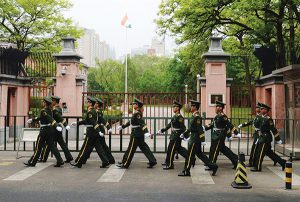Bloomberg
Beijing wants India to reaffirm the “One China†policy as it seeks to shore up regional support after US House Speaker Nancy Pelosi’s visit to Taiwan, which triggered aggressive military drills by the Chinese military around the island.
“We hope that the Indian side could openly reiterate its One China policy like many other countries,†Sun Weidong, China’s ambassador to India, said in a post on the embassy’s website. “The One China principle is the political foundation of the China-India relations,†he said in a summary of his comments at a briefing in New Delhi. More than 170 countries and international organizations have reaffirmed their commitment to the principle, he said.
India follows the “One China†policy and recognizes the government in Beijing only, but hasn’t mentioned it in bilateral documents or in public statements for a long time. Public sentiment towards China has soured in the wake of deadly border clashes between the two neighbours in 2020, the worst in four decades.
The South Asian nation’s deliberate ambiguity and reluctance to reiterate the principle is in contrast to countries of the region and the G-7, whose members include the US, the UK, Japan and Germany. The G-7 foreign ministers said in a statement this month that there was “no change†in the “One China†policy or on Taiwan. Members of the Association of Southeast Asian Nations have reaffirmed they only recognize Beijing.
“India’s relevant policies are well known and consistent,†Arindam Bagchi, a spokesman for the Ministry of External Affairs, told reporters, without mentioning the “One China†policy, when asked about the tension around Taiwan. India urged all parties to exercise restraint and avoid unilateral action to change the status quo.
New Delhi has stopped referring to the policy in public since 2008 when Beijing issued a series of statements claiming India’s eastern province of Arunachal Pradesh and issued “stapled†visas to some residents of Jammu and Kashmir.
Pelosi’s visit to Taiwan has prompted the Chinese military to carry out military exercises designed to show its ability to encircle the island and cut off the Taiwan Strait, one of the world’s busiest trade routes. It has launched missiles that likely flew over Taipei and into waters Japan claims as an exclusive economic zone.
Ambassador Sun reiterated China’s stated position that the US and Pelosi were solely responsible for the tension around Taiwan and Beijing’s response, including military drills and sanctions on the US House Speaker.
Meanwhile, Sri Lanka defended its decision to allow a Chinese scientific research ship to call at its shores after deferring an earlier request amid concerns raised by India and the US over such a move.
The Yuan Wang 5 was cleared to dock at Hambantota port from August 16 to 22 after the government “engaged in extensive consultations at a high level through diplomatic channels with all parties concerned,†including seeking “further information and material,†the Ministry of Foreign Affairs said.
The South Asian island nation is experiencing political and economic turmoil after defaulting on debt for the first time and has endured months-long protests. The government previously deferred a request by the Chinese embassy on June 28 to allow the ship a port call in mid-August for replenishment purposes. The earlier postponement was made after “certain concerns†were raised, according to Sri Lanka’s foreign ministry. India’s Ministry of External Affairs said on July 28 in response to questions on the ship’s proposed visit that it is carefully monitoring any development that might have a bearing on India’s security and economic interests, and “takes all necessary measures to safeguard them.â€
The US has also been lobbying the government to revoke Chinese access to the port, the Washington Post previously reported, citing an unnamed Sri Lankan official.
 The Gulf Time Newspaper One of the finest business newspapers in the UAE brought to you by our professional writers and editors.
The Gulf Time Newspaper One of the finest business newspapers in the UAE brought to you by our professional writers and editors.
